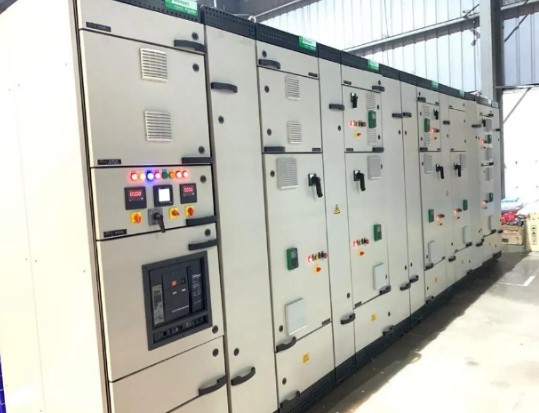An Intelligent MCC (Motor Control Center) Panel is an advanced version of a traditional MCC panel, designed to control and monitor motors with enhanced automation and intelligence features. It integrates communication capabilities, smart sensors, and programmable logic controllers (PLCs) to provide real-time data and remote control of motor operations. This helps in improving efficiency, reducing downtime, and providing predictive maintenance capabilities.
Key Features of an Intelligent MCC Panel:
- Automation: Allows for automatic control of motor operations based on pre-set parameters and real-time data.
- Remote Monitoring and Control: Equipped with communication systems (such as Ethernet, Modbus, or Profibus) to monitor and control the motors from remote locations.
- Energy Efficiency: Helps optimize motor operations, reducing energy consumption and operational costs.
- Fault Detection and Diagnosis: Intelligent sensors detect faults and provide real-time alerts, allowing for quicker troubleshooting and repairs.
- Data Logging and Reporting: Records operational data, enabling detailed performance analysis and predictive maintenance.
- Programmable Logic Controllers (PLCs): Allows for customized control logic for specific motor operations, improving system flexibility.

An Intelligent MCC (Motor Control Center) Panel is an advanced version of a traditional MCC panel, designed to control and monitor motors with enhanced automation and intelligence features. It integrates communication capabilities, smart sensors, and programmable logic controllers (PLCs) to provide real-time data and remote control of motor operations. This helps in improving efficiency, reducing downtime, and providing predictive maintenance capabilities.
Key Features of an Intelligent MCC Panel:
- Automation: Allows for automatic control of motor operations based on pre-set parameters and real-time data.
- Remote Monitoring and Control: Equipped with communication systems (such as Ethernet, Modbus, or Profibus) to monitor and control the motors from remote locations.
- Energy Efficiency: Helps optimize motor operations, reducing energy consumption and operational costs.
- Fault Detection and Diagnosis: Intelligent sensors detect faults and provide real-time alerts, allowing for quicker troubleshooting and repairs.
- Data Logging and Reporting: Records operational data, enabling detailed performance analysis and predictive maintenance.
- Programmable Logic Controllers (PLCs): Allows for customized control logic for specific motor operations, improving system flexibility.
